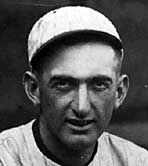Shoeless Joe Jackson
|
|
Joseph Jefferson "Shoeless Joe" Jackson (July 16, 1889 - December 5, 1951) was a left fielder in Major League Baseball who played for the Philadelphia Athletics, Cleveland Indians and Chicago White Sox. One of the greatest hitters of his era, he was one of eight players banished for life from professional baseball for his alleged participation in the Black Sox scandal, this being the basis for his exclusion from baseball's Hall of Fame.
He is considered to be one of the most outstanding hitters in the history of the game, to the point that Babe Ruth claimed that he modeled his hitting technique after Jackson's. Jackson is the only rookie to have batted over .400; he hit .408 for Cleveland in 1911 (although he would not be considered a rookie by today's definition). His career .356 batting average is the third highest in history, after Ty Cobb and Rogers Hornsby.
The nickname "Shoeless" came from a minor-league game he once played when he was suffering from blisters on the feet from a new pair of spikes. He was sitting the game out, but a shortage of players obliged him to play. With no other option at one point, he played in his socked feet and hit a triple in one at bat. When he arrived at third base, a fan yelled out "You shoeless son-of-a-gun, you!" and the name stuck.
| Contents |
Black Sox scandal
Jackson always maintained his innocence about the Black Sox scandal and insisted that he was playing with his best effort in the 1919 World Series. Supporters point out the World Series statistics show that he maintained a .375 batting average and played well in the field, throwing out five baserunners and handling thirty chances in the outfield with no errors. On the basis of these statistics, they maintain that Joe was obviously not participating in the players' conspiracy.
Jackson's detractors counter that he seemed to have hit well only when there were no runners on base or when games were out of reach, and that he hit poorly at points when he could have most helped his team. In the five games that the White Sox lost (in the best-of-nine Series), Jackson had only one RBI, that coming on a home run in the deciding game 8.
Also against his case is the fact that Jackson admitted under oath that he agreed to participate in the fix, and accepted $5,000 as partial payment for his cooperation. He also admitted to complaining to other conspirators that he had not received his full share. His banishment was based primarily on these admissions. A jury, however, acquitted him of criminal charges related to the scandal, although the trial itself could also be regarded as having been fixed, key evidence having gone missing from the prosecutor's office shortly before the trial.
In the fifth inning of game 4 Jackson made a telling play from left field. With a Cincinatti player on second a single was hit to left field and fielded by Jackson. He then fired the ball towards home plate. Eyewitness accounts say that the ball was heading directly for home plate and would have resulted in an out had pitcher Eddie Cicotte, one of the ringleaders of the fix, not directly interfered with the throw. Because of Cicotte's actions a run scored. The White Sox would lose the game 2-0. The Official Scorer of the 1919 World Series, James C. Hamilton testified under oath in a later civil trial between Jackson and Charles Comiskey the the throw was honest and that Cicotte jumped up, knocked it down and booted it for an error. Jackson, if indeed in on the fix, could easily have thrown off target. The fact that Cicotte took it upon himself to knock the ball down leads many to conclude that Cicotte knew Jackson was playing honest ball. Further supporting Jackson's innocence is the autobiography of Chick Gandil, another ringleader of the fix,. He would admit to yelling at Cicotte to intercept the throw so that the run would score. Many believe that this play shows that both ringleaders of the fix knew Jackson to be playing honest ball and did not trust him to throw the games.
The phrase "Say it ain't so, Joe" is based on a young fan's comment to Jackson when he heard of the Black Sox scandal (possibly apocryphal; Jackson denied that there was any such incident).
After being banned from the majors, Jackson played extensively in semipro leagues in Georgia and South Carolina. He never played under an assumed name as the films Field of Dreams and Eight Men Out suggest. In fact he earned a healthy living as a ballplayer and also as a successful businessman after the ban. In 1929 he and his wife, Katherine, moved to Greenville, South Carolina. He died in Greenville and is buried in Woodlawn Memorial Park there.
External links
- Template:Baseball-reference
- Shoeless Joe Jackson's Virtual Hall of Fame (http://www.blackbetsy.com/)
- The Official Web Site (http://www.shoelessjoejackson.com/)
Books
- Shoeless Joe, a novel by W. P. Kinsella
- Eight Men Out, by Eliot Asinof, an account of the 1919 World Series fix
- Joe Jackson: A Biography, by Kelly Boyer Sagert
- Say It Ain't So, Joe!: The True Story of Shoeless Joe Jackson, by Donald Gropman, also includes the Ted Williams and Bob Feller Petition to admit Jackson into the Baseball Hall of Fame
Films
- Eight Men Out, directed by John Sayles, based on the Asinof book and starring D.B. Sweeney as Jackson
- Field of Dreams, based on the Kinsella book, with Ray Liotta as Jacksonja:ジョー・ジャクソン

